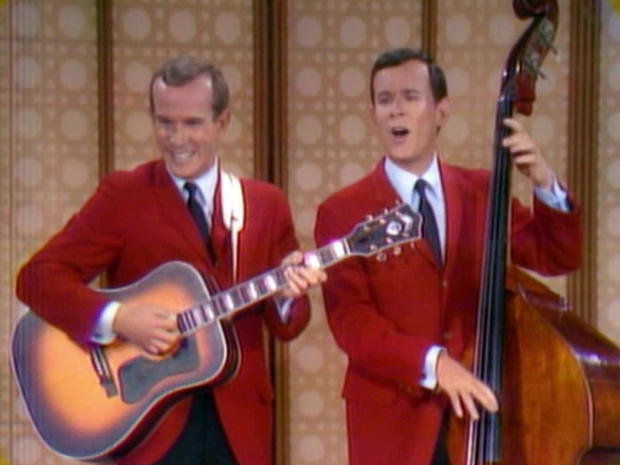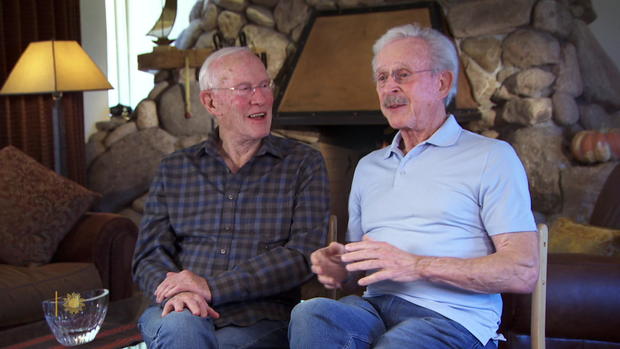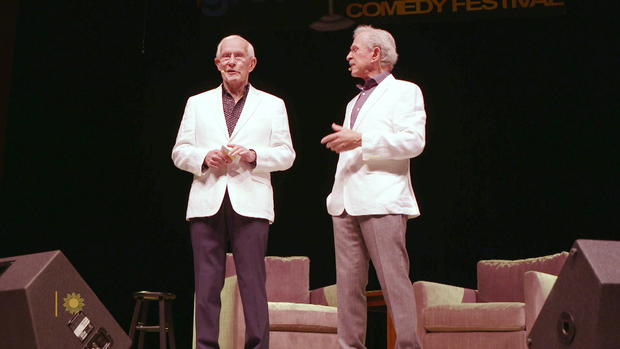Tom and Dick Smothers never expected to be back on camera again at this point of their lives. They especially didn’t think they’d be appearing on CBS, the network that famously cancelled their top-rated show back in 1969 – the show that turned prime time TV upside-down.
Tommy was on guitar; Dick was the straight man on the bass. “Looking back on it, we look so naïve, and so pure, and so clean,” said Dick.
Correspondent Lee Cowan asked, “Did you think of yourselves as standup comedians early on?”
“No. We thought of ourselves as folk singers,” Tom replied.
CBS
There were an almost instant hit. Just two weeks after the show premiered, “The Smothers Brothers Comedy Hour” beat “Bonanza” in the ratings, which at the time was practically unthinkable. “It was just the biggest thrill, it was unbelievable!” said Dick.
They were truly charming, especially their famous bouts of sibling rivalry. (“Mom liked you best!”) They say the truth was, their on-stage arguments weren’t all that different than the arguments they had backstage. Tom said, “In fact, we were getting on so poorly, he set up a thing where we had couple counseling.”
“‘Cause we’re a couple,” said Dick. “It was in this room. Right here.”
“It helped us so much. It made a big difference.”
“Yeah. It prolonged our career.”
Their youth is what appealed to CBS, which was struggling to garner a younger audience. When their series hit the air in February 1967, Dick was only 29, and Tom was 30, which meant they were also young enough to get caught up in the political and social upheavals of the 1960s, Tommy especially….
Dick: “Our government is asking us as citizens to refrain from traveling to foreign lands.”
Tommy: “Okay, all you guys in Vietnam, come on home!”
Tommy didn’t necessarily see himself as political, he says, but he was socially conscious, and along with the show’s other writers (including Steve Martin and Rob Reiner), nothing was off-limits.
Tommy: “For the start of his term, we are going to give our President Nixon our full support, and lay off the jokes entirely.”
Dick: “That’s right!”
Tommy: “He’s going to be in office for at least four years, and I’m sure we’ll be able to get around to him.”
Even the show’s musical guests were stars of the counterculture – performers like Pete Seeger, who sang the anti-war song “Waist Deep in the Big Muddy.” “There was never premeditation for anything we ever did,” said Tom. “We never did it to get attention. We just did it. And if it got attention, I said, ‘I’ll do it again. Maybe we’ll get some more attention.'”
As their humor got sharper, the CBS censors started sharpening their scissors, cutting out controversial content, sometimes entire skits, putting Tommy on the defensive. “I was offended. ‘What do you mean I can’t say that?’ All of a sudden, it became something more.”
Cowan asked, “So, as they started sort of cutting more and more, you kept kind of poking the bear more and more though, too, right?”
“It became slowly, I was poking the bear,” he smiled.
CBS News
And how did Dick feel about it? Tom recalled, “Well, he said to me one time, ‘You sure you know what you’re doing?”
According to Dick, “I wasn’t sure that was the right thing to do. I said, ‘Well, let’s pull back, and just do what we were doing. And then, maybe the show would have one more season.’ I didn’t think they were gonna fire us.”
But, they did. The brothers sued CBS for breach of contract, and they won, but it was little comfort. The duo had been banished.
Cowan asked Dick, “You never really blamed Tommy for the show ending, right?”
“For crying out loud, no! He created everything. I was confident in our talent, in our show, and what we did together.”
“I was just pretty angry near the end where I wasn’t funny,” Tom said. “I was doing material, it was kind of mean comedy. I needed to be fired. If we would have gotten another year, it’d have been strident!”
They didn’t give up performing; they did a few more TV and stage shows. CBS even invited them back for a time. But the magic of those early years was gone.
Next month the duo, both now in their mid-80s, are taking their show on the road again. “Walking on that stage, feel that kind of love coming back, attention to us, that’s kind of sweet,” said Tom.
They’ve been working on honing their show for months, most recently testing out material in Norfolk, Nebraska, Johnny Carson’s hometown.
Gone are the musical instruments, and the singing, but not their timing.
Tom: “When I die, I want to die like my grandfather did, in his sleep, not in stark terror, like the rest of the people in the car that he was driving!”
“This is kind of a victory lap or something,” Tom said. “Just to go by these people one more time and to take a look at these brothers that they liked a lot to see how they, ‘Oh, they don’t look that bad!'”
They remain forever showmen; their sense of stagecraft was refined from years of doing live television. And while there’s plenty of reminiscing in the stage production, the show is full of new material, too.
Dick: “Being a comedy team is a lot like a marriage. It’s like a long, 50-year marriage.”
Tom: “A lot of fighting and no sex!”
CBS News
Speaking of marriage, Dick just had his fifth this past September; Tommy was the Flower Boy.
Being together, they say, is more important now than ever. Tommy lives on his vineyard in Northern California; Dick is currently living in upstate New York, and they only get together three or four times a year.
The Smothers Brothers were always better together. Their bond outlasted their critics, and in the end paved the way for so much of what makes us smile to this day.
Tom said, “People laughing is holy. And if you can be part of that, and control it, and create it, it’s the best thing ever.”
Dick added, “When someone said, ‘What’s the happiest time in your life,’ it’s standing on that stage with my brother a few inches away on my right and having that feeling with that audience. That defines my whole life. There’s nothing better.”
For more info:
Story produced by Kay Lim. Editor: Lauren Barnello.


